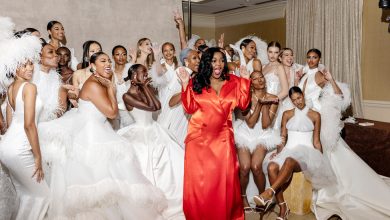Ready to Get Married Already? Some Couples Face Postponement Fatigue

When Leslie Krivo-Kaufman and Israel Geselowitz heard news of the Omicron variant’s spread, a familiar frustration overcame them. The couple, who live in Brooklyn, had started talking about planning a wedding in December 2019. By late last year, they had already postponed their date three times and had to cut their guest list in half because of the pandemic.
The thought of having to postpone again was daunting. Ms. Krivo-Kaufman, 30, and Mr. Geselowitz, 29, decided to keep their plans for a March 2022 wedding and to proceed with caution by ensuring all guests are vaccinated and possibly asking them to take rapid Covid tests in order to attend.
“I think we’re at a point where it feels like it needs to happen no matter what, which is not to say that we’ll proceed with an event that does not feel safe and comfortable,” said Ms. Krivo-Kaufman, who added that they would scale back their event as much as needed for it to happen. “If we have to decide it’s just us and our immediate families and everyone has to wear a mask, then that’s what it is. We’re going to follow through with whatever version of following through with it feels safe at the time.”
This year, nearly 2.5 million weddings are expected to happen in the United States, according to data from the Wedding Report, a trade group in Tucson, Ariz. Its findings estimate that about 20 percent of weddings planned for 2021 were postponed to 2022, and that roughly half of the weddings originally set for 2020 were postponed to 2021 or beyond.
And after two years of planning and rescheduling ceremonies because of the pandemic, some couples, like Ms. Krivo-Kaufman and Mr. Geselowitz, are experiencing postponement fatigue. Despite the spread of the Omicron variant, they’re moving forward, even if that means having a smaller wedding or reworking the event to include safety precautions.
For large gatherings, the Centers for Disease Control and Prevention recommends ensuring attendees are up-to-date with vaccination status, and that they are tested before an event. The C.D.C. also suggests avoiding crowding and making sure a venue is well-ventilated.
Melissa Gabriel, the owner of Honey Bee Weddings & Events in Manhattan, said that her clients with weddings scheduled for February and March 2022 are conscientiously forging ahead. “People are really just pressing forward and making up their own guidelines and how they can get themselves down the aisle safely,” she said.
The surge of the Delta variant last summer, she said, has helped her better equip clients who want to avoid postponing because of Omicron. “People were extra cautious then, going back to asking people to wear masks, even for outdoor events and even when it wasn’t required by legislation. Some were requiring guests to be tested 24 hours before,” she said. “That’s what I’m seeing now. People resorting back to being safer, rather than wanting to cancel.”
Audriana White, who owns Noble Gold Events in Brooklyn, said the first 2022 wedding she is working on is in April, and that her clients are also trekking along as of now. “I haven’t had anyone who has considered canceling or postponing their wedding yet. At this stage, we’re in a solid place as far as planning is concerned, so it makes the decision to cancel or postpone a very difficult one,” she said.
The last two years “have certainly been trying and causing anxiety and frustration,” she said. “It seems my clients are in a place where whoever is able to attend, will. But their show must go on. It’s been quite the emotional roller coaster.”
Ms. White is preparing for potential new variants to arise as well. “We’re focusing on whatever precautions we can take” for clients who don’t want to postpone, she said. Right now, that includes adhering to regulations set by venues, states and localities, making sure vendors are masked for the entire event and encouraging guests to self quarantine before attending.
Nico and Sarah Theofanidis, who live in Old Greenwich, Conn., and are 33 and 34, respectively, became engaged in the summer of 2019. They had initially planned a wedding for the summer of 2020, but when the pandemic hit, they opted for a backyard ceremony with only immediate family and postponed their larger celebration to July 2021. Then, as the Delta variant started to spread, they again postponed their party to June 2022 — a date they intend to keep.
“We’re very much looking forward to celebrating with family and friends in the summer,” said Ms. Theofanidis.
While a willingness to accept a wedding that may be different in size or style than originally envisioned is leading some couples not to postpone, there are other factors. Tzo Ai Ang, the owner of Ang Wedddings and Events in Manhattan, said she is noticing that vendors are offering less wiggle room for changes to contracts than they did earlier in the pandemic when local governments declared official lockdowns.
“As businesses, they can’t keep canceling and rescheduling. If events can actually go ahead, putting all the safeties into place — vaccination, testing, all of that — it’s hard for a venue to allow a client to cancel or change a date without any repercussions,” she said.
Seth Rosen, 37, and Martha Burla, 36, who live in Chicago, were originally supposed to get married in January 2021, but postponed the event by a year. “The idea of scaling down, doing something smaller, just having a small family event wasn’t really interesting to either of us. We said we’ll wait and have a full wedding when we can,” Mr. Rosen said.
News of the Omicron variant was particularly frustrating, he said, because the venue they booked for their wedding on Jan. 15 would not allow them to cancel or postpone and still get their money back. Citing safety concerns, guests also started to drop out, resulting in the type of scaled down event that the couple had hoped to avoid by postponing in the first place.
“Last year, people were kind of forced to cancel. We didn’t have options then, the city was on lockdown, we had to cancel,” said Ms. Burla. “But this year doesn’t really feel like we have options either.”
Mr. Rosen said the cancellations were “fully understandable,” adding “we’re not mad about it.” Without any alternative but to move forward, the couple went into a quarantine for two weeks at the beginning of January.
“Because the venue wasn’t letting us cancel, I thought, ‘What’s the worst case scenario?’ And either of us getting Covid was obviously the worst case scenario,” Ms. Burla said. The lead-up to their wedding “was a series of highs and lows,” including guest cancellations all through December and “at least 20 cancellations in the two days before the wedding.” The couple had originally invited 180 guests; in the end, around 90 people attended.
But “most importantly,” she said, “we got married, had a beautiful and very fun day, and no one caught Covid at our event, which felt like a miracle.”





